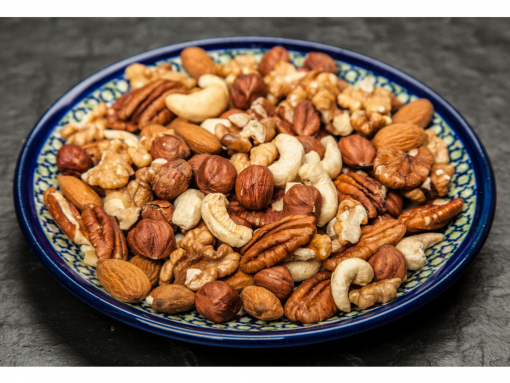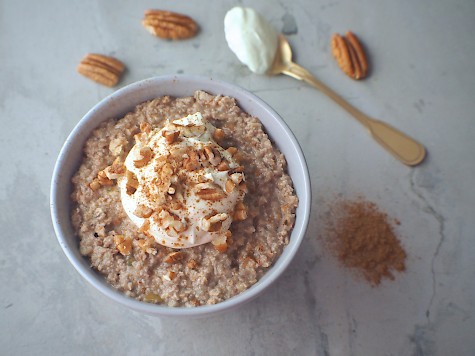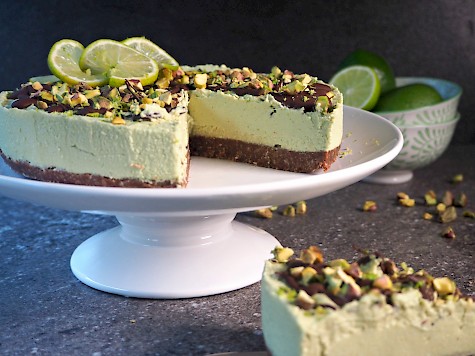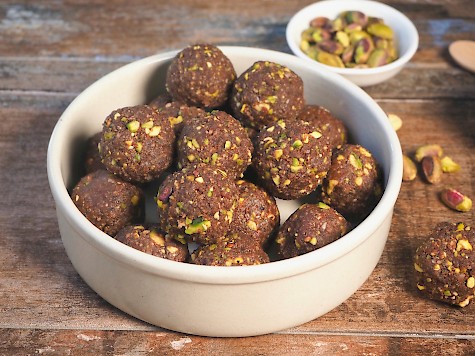Nuts are a powerhouse of tasty nutrients. They are packed with protein, fibre, vitamins, minerals and antioxidants. A serving size is 30g or a small handful of whole nuts or 2 tablespoons of nut butter/spread. Many new clinical studies have highlighted heart-related health benefits of nuts. They showed that adding 30g of nuts per day lower the risk of heart disease by 30% - 50% when eaten as part of a healthy diet. The nuts that came out on top for heart health were macadamias, walnuts, almonds, pecans, pistachios and hazelnuts.

Macadamias and Walnuts are especially high in omega 3 fatty acids, the same heart-healthy fat found in oily fish but are much easier to pop in your pocket for a portable snack. In addition to being a great snack, nuts are fabulous in salads, stir-fries, breads, ground down to make gluten free flours for baking, nut butters and when added to smoothies, give a lovely creamy consistency.
Let's See How Eating Nuts Can Help Your Heart
One way nuts may help your heart health is by lowering the LDL (bad) cholesterol levels. LDL plays a role in plaque that builds up on the blood vessels. Eating more nuts has also been linked to lowering levels of inflammation that are linked to heart disease. Eating nuts may also reduce your risk of developing blood clots that can cause heart attacks. They also appear to improve the health of the lining of your arteries. Omega 3 fatty acids, can help prevent the development of erratic heart rhythms. Nuts are rich in arginine, an amino acid needed to make nitric oxide that relaxes the blood vessels and eases blood flow. They also contain vitamin E, folic acid, potassium and fibre.
Let's Have A Look At Our Favourite Nuts
Macadamias: As mentioned previously, they are high in Omega-3 fatty acids and a clear winner when it comes to healthy fats. They are an anti-inflammatory nut due to their high mono-unsaturated fat content. Macadamias are a great source of fibre, magnesium, thiamin, manganese, calcium and potassium. They are very high in the B Vitamins. When soaked and blended, macadamias make a delicious dairy-free cream that's perfect for making raw 'cheesecakes' and desserts. Buy in small quantities and store in the fridge to keep fresh and avoid the oil in the nut going rancid.
Walnuts: Their superior antioxidant contents means walnuts are useful in the fight against cancer. They are also a good source of mono-unsaturated heart healthy fats and rich in omega-3 as mentioned above and play a part in keeping our heart and arteries healthy. Walnuts are good for our bones, they increase calcium absorption. They are an excellent source of fibre and the minerals found in them include, calcium, iron, magnesium, phosphorous, potassium, zinc, copper and manganese. They also contain vitamins C, B6, B12, E, K and A. Walnuts have always been considered as 'Brain Food', due to their appearance like the brain, whether they increase our intellect, I don't know. (They contain Omega-3 which I read increases the activity of the brain). Store in the fridge to keep fresh and protect the nut oils.
Almonds: Adding almonds to your diet can help lower your LDL (bad) cholesterol which in turn helps to prevent heart attacks. The vitamin E in almonds also plays a part in heart health due to the antioxidant action of the vitamin. Clinical studies have shown almonds can also reduce the risk of insulin resistance and diabetes, plus assist in losing weight. Almonds are also high in magnesium, potassium and calcium. They are an excellent nut to use for making dairy-free milk and when blanched and ground, they make a wonderful flour replacement in gluten and grain free baking.
Pecans: Heart-friendly pecans are packed with plant sterols, valuable compounds that are effective at lowering bad cholesterol levels. Pecans are also antioxidant-rich which also helps the heart. They are rich in oleic acid, the healthy fat found in olives and avocados. Pecans are a good source of vitamin B3 and help fight fatigue. They are very high in potassium and also contain, copper, thiamin, magnesium, zinc and phosphorus. Pecans are a great choice in desserts (think pecan pie) and are delicious roasted.
Pistachios: Studies have shown pistachios help lower blood pressure when under stress. A diet rich in pistachios (about 10 - 20g a day) improved heart rate response to stress and heart function and output. They are especially rich in vitamin B6, which is important for keeping hormones balanced and healthy. Pistachios are the only nut to contain reasonable levels of lutein and zeaxanthin, two antioxidants that play an important role in protecting the eyes. They also contain potassium and lots of fibre. Add pistachios to your favourite muffin recipe, to dukkah mixes to coat grilled steak or fish and they are delicious tossed through a salad.
Hazelnuts: Hazelnuts aren't just good for your heart, they are also helpful for conditions like Parkinson's in managing the symptoms. Hazelnuts are a good source of folate, and contain several flavonoids (preventing cell damage) that may support brain health, improve circulation and reduce symptoms associated with allergies. They are a rich source of vitamins and minerals, especially high in vitamin E in addition to B vitamins and assist in improving skin, hair and nails. Hazelnuts add a rich nutty flavour to baked desserts and are delicious ground down to a nut meal to use in gluten free baking.
Cashews: Cashews contain a good level of protein and are a useful source of minerals like iron and zinc. They are also rich in the mineral magnesium, which is thought to improve recall, and delay age-related memory loss. Cashews are another nut that is perfect to soak and blend to make dairy-free desserts and milk. They are a less expensive nut which has made them popular as a base for nut and energy bars. An excellent nut to roast and add to your stir-fry or salad.
Brazil Nuts: An ideal nut to eat for those with low thyroid function. Brazil nuts are a good source of the mineral selenium, which we need to produce the active thyroid hormone. Selenium also supports immunity and helps wounds to heal. You only need 3 Brazil nuts a day to get the recommended daily intake. Add 3 nuts to a smoothie, or just grab 3 a day for a healthy snack.
I Have A Few Recipes To Use Your Heart-Healthy Nuts In.
BREAKFAST:
Apple and Cinnamon Porridge (nuts replace oats) - click for recipe
DINNER:
Hearty Beef Pot Pies (ground almonds are used in this GF pastry) - click for recipe
DINNER:
Pad Thai (nut butter is used in the sauce and cashews sprinkled on top) - click for recipe
DESSERT:
SNACK:
Can You Eat Too Many Nuts? The answer is yes, the best approach to eating nuts is in moderation.
I've talked about eating nuts for a healthy heart but I also need to point out, eating nuts won't do much good if you gobble down bowls of them in addition to your regular snacks and meals. Nuts are very dense and are high in kilajoules and if you over consume you could gain weight, and that won't help towards a healthy heart. A small handful of nuts, 30 - 50g per day, however, is not associated with weight gain and may help reduce the risk of obesity and Type 2 Diabetes.
Nut allergies are a major concern for a small proportion of the population. People can be allergic to one or more of the tree nuts or peanuts. Peanuts are actually not a nut but a legume (bean). For more information on managing tree nut allergies, download or review the fact sheet from www.nutsforlife.com.au or www.allergyfacts.org.au
Store all your nuts in the fridge or freezer to protect the healthy fats contained within them and avoid the oils going rancid. Make sure to check out the recipes above and add a variety of nuts to your diet to reap the health benefits.
Reference articles: Mayo Clinic/Eating nuts for heart health, Nutrition Australia/Nuts and Health, BBCGoodFood/The health benefits of nuts
By Susan Joy







 I've battled with Chronic Fatty Liver Disease, an Autoimmune Thyroid Disease (Hashimoto's), Arthritis and digestive issues for many years. I decided to conduct my own research on what food choices could help my conditions. These choices culminate under what is termed a Paleo Lifestyle. I live in Perth, Western Australia with my husband of over 49 years. I'm the author of The JOYful Table cookbook, A JOYful Christmas, The JOYful Table 5-week Meal Plan and The Paleo Bread Cookbook.
I've battled with Chronic Fatty Liver Disease, an Autoimmune Thyroid Disease (Hashimoto's), Arthritis and digestive issues for many years. I decided to conduct my own research on what food choices could help my conditions. These choices culminate under what is termed a Paleo Lifestyle. I live in Perth, Western Australia with my husband of over 49 years. I'm the author of The JOYful Table cookbook, A JOYful Christmas, The JOYful Table 5-week Meal Plan and The Paleo Bread Cookbook.